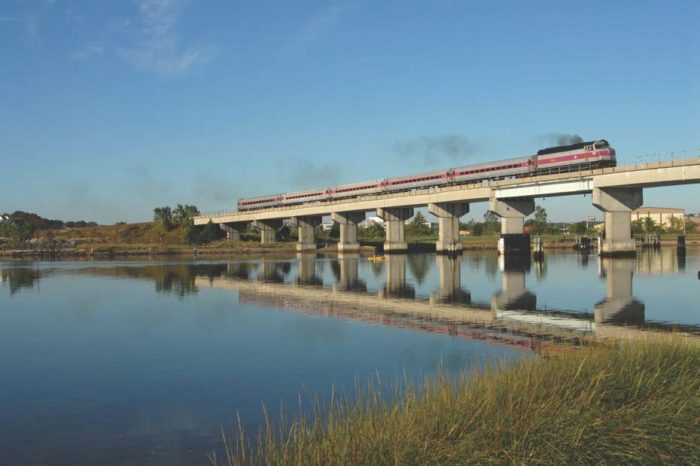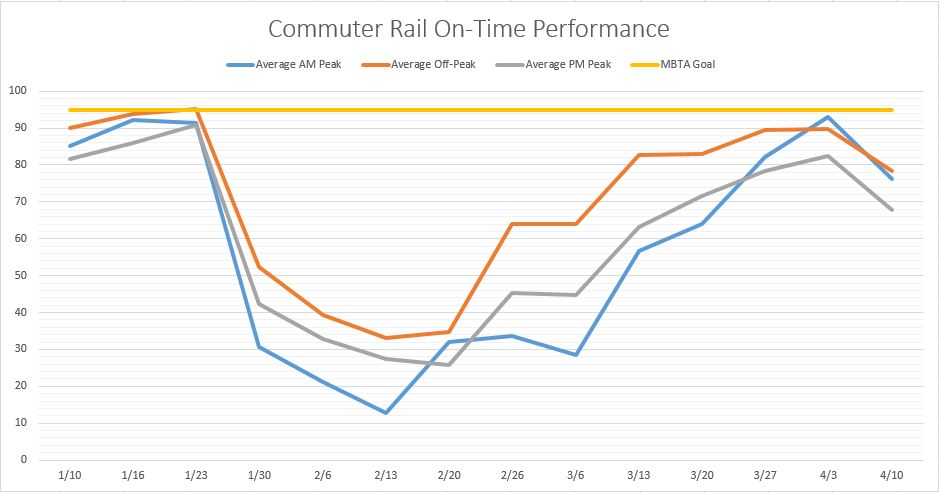Is Keolis Up to the Task?
The snow has melted from our streets, our fields are filled with oblivious geese, and the lights at Fenway shine on the Sox once again; all signs that Spring has finally arrived.
But there is one thing that hasn’t changed, and another that we must not allow to fade. The MBTA is still struggling to snap out of a snow-induced coma, and our wait for a meaningful solution must hold firm as the failings of February retreat into the past.
New on-time performance figures released yesterday show that last week’s return to normality may have been the peak of a dangerously sinusoidal pattern, hinting at continuing management problems at Keolis.
The average on-time performance during the morning commute two weeks ago was 93.03 percent, a respectable figure when compared nationally, and the first time it rose above 90 percent since mid-January. Last week that number dropped to 76.08 percent. Evening peak performance dropped from 82.56 percent to 67.72.
While many southern lines were hampered by Amtrak switch issues at Ruggles, it is clear that the timeliness issues are systemic, and that the snow wasn’t the only cause of commuters’ distress.
The Stoughton line has failed to reach above 80 percent on-time performance this year during the evening commute. Its best week yet came during mid-March, but its on-time performance dropped to 32 percent last week.
Similarly, the Fairmount line’s highest on-time performance score during an evening commute since the storms of late January is only 68 percent. The line averages about 42 percent since January 26th.
The MBTA itself agrees that the snow wasn’t the only issue. Keolis attempted to invoke a clause in its contract which would exempt the commuter rail operator from fines due to poor service, cleanliness, and a host of other issues.
Contractually, the MBTA can only fine Keolis $868,850 per month, the assumed profits of the commuter rail operator. Fines for late and cancelled trains are limited to half of that figure, while cleanliness and staffing issues can make up the other half.
The MBTA conceded that Keolis deserved a break due to the intense nature and unfortunate timing of this winter’s storms. However, they disagreed over the extent of the waiver. In January, Keolis was fined the maximum for late trains, $434,425, but only $273,000 for other issues. In February, both categories of fines reached their limits.
Since Keolis took over the commuter rail system last July the fines have piled high, totaling $4.07 million in just eight months. Keolis averages over $508,000 in fines a month out of a possible $868,850.
Even if Keolis’ work this winter is disregarded, their performance since the contract’s inception in July leaves a lot to be desired. In every month for which data is available, with the exception of October, Keolis did worse than the Massachusetts Bay Commuter Railroad Company did in the corresponding month during the prior two years.
Keolis is currently on track to achieve mediocrity. If public anger and resentment melts as the snow did, than Keolis will have gotten out of jail for free. To let out anger fade is to be complicit with Beacon Hill’s politicians and the MBTA’s bureaucrats in the commuter rails demise through indifference.
Don’t forget the mornings of mixed messages about delays, don’t forget the guy next to you who never bought a ticket and never got caught, don’t forget the trains that never came, and don’t forget that Keolis was struggling before this winter even began.
Scott Haller is a student at Northeastern University working at Pioneer Institute through the Co-op program.




